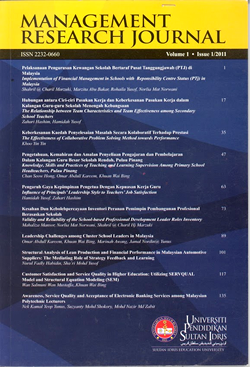Handling multi-grade teaching: It’s educational implication towards teachers’ competence
DOI:
https://doi.org/10.37134/mrj.vol9.2.1.2020Keywords:
Multi-grade, Handling, Implication, Competence, EducationAbstract
This study aimed at determining the educational implication of teaching multi-grade pupils towards teachers’ competence in Alfonso Lista, Ifugao. Descriptive research was utilized in this study anchored on the instructional practices while qualitative research was used in order to determine the interventions to improve the teachers’ competence in handling multi-grade pupils. The respondents of this study were 40 multi-grade teachers and school heads, combined, in Alfonso Lista District. Total enumeration was employed. Mann Whitney-u test was used in order to determine and analyze the significant difference between the teachers and school heads about the degree of seriousness encountered by the teachers in handling multi-grade classes. Based on the findings, it showed that teaching multi-grade classes with cooperative learning activities plays a vital role in the teaching-learning process. Also, the preparation of lesson plan and visual aids adversely affect the teaching performance of the teachers. In addition, overlapping activities contribute to the failure in the teaching-learning process. Generally, there is no significant difference between the teachers and the school heads in handling multi-grade pupils. Moreover, most of the problems encountered by the school heads and teachers as facilitators are moderate/minor. As regards these, teachers and school head work hand in hand to monitor the multi-grade classes. It is recommended that the teacher should introduce active learning and cooperative learning activities among pupils. The school administrator shall allocate fund for the provision of instructional materials and visual aids to be utilized in teaching multi-grade classes. To lessen problems in teaching multi-grade classes, the school head may initiate crafting school policy in handling multi-grade classes specifically in scheduling. In addition, the school shall conduct trainings and workshop about teaching strategies in handling multi grade classes.
Downloads
References
Aksoy, N. (2008). Multi-grade schooling in Turkey: An overview. International Journal of Educational development, 28, 218-228.
Berry, C. (2010). Multi-grade Teaching: A Discussion Document. Available from
(http:/www.ioe.ac.uk/multi-grade).
Brown, B.A. (2008). Multi-grade Teaching: A Review of Selected Literature and Implications for Teacher Education and Training in South Africa. Faculty of Education: University of Fort Hare.
Brown, B.A. (2010). Teachers’ Accounts of the Usefulness of Multi-grade Teaching in Promoting Sustainable Human- Development Related Outcomes in Rural Africa. University of Fort Hare, East London.
Juvane, V. (2005). Redefining the Role of Multi-Grade Teaching. Working Document Prepared for the Ministerial Seminar on Education for Rural People in Africa: Policy Lessons, Options, and Priorities. Addis Ababa, Ethiopia, 7-9 September, 2005. ADEA Working Group on the Teaching Profession.
Little, A W. (2005). Learning and teaching in multi-grade settings. Background paper for UNESCO (2005) EFA Global Monitoring Report.
Pridmore, P. (2007). Adapting the Primary School curriculum for multi-grade classes in developing countries: a five-step plan and an agenda for change. Journal of Curriculum Studies, 39(5), 559-576.
Rajagani, V. (2019). Review of succession planning research. Management Research Journal, 8, 58-65. Retrieved from http://ejournal.upsi.edu.my/index.php/MRJ/article/view/2914
Ritland, V. & Eighmy, M. (2013). Multi-age Instruction: An Outdated Strategy, or a Timeless Best Practice. The European Journal of Social & Behavioral Sciences.
Shaukat, A. (2009). Delivering girls’ education in Pakistan. Retrieved from
http://www.ungei.org/resources/files/delivering-education-pakistan-ukfliet09.pdf.
Taole and Mncube (2012). Training in Time Management for Teachers who Teach in Multi-Grade Classes.
United Nations Educational, Scientific and Cultural Organization-UNESCO (2015)
Downloads
Published
Issue
Section
License
Copyright (c) 2020 UPSI Press

This work is licensed under a Creative Commons Attribution-NonCommercial-ShareAlike 4.0 International License.





